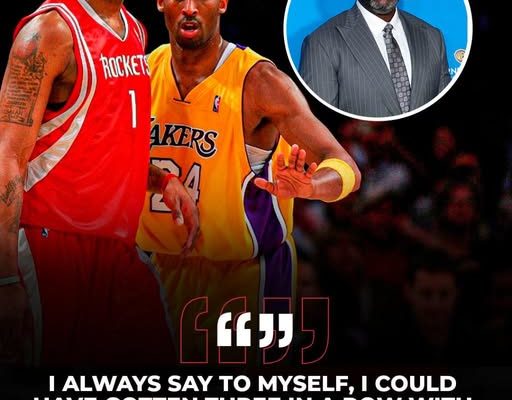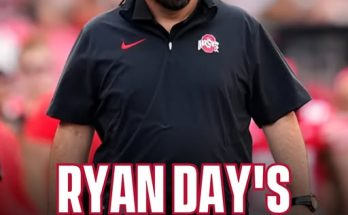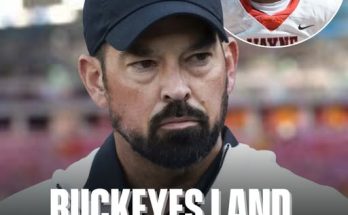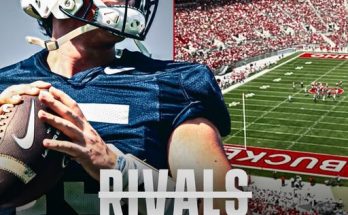The whispers began as a ripple, a provocative assertion, and then, with Shaquille O’Neal’s emphatic endorsement, they swelled into a full-blown wave of debate across the basketball landscape. The claim: that the Los Angeles Lakers’ legendary three-peat, the dynasty forged by the formidable duo of Shaq and Kobe Bryant in the early 2000s, could have still happened even if Tracy McGrady had been Kobe’s running mate. This isn’t just idle locker-room chatter; it’s a “what-if” scenario that cuts to the very heart of NBA greatness, team dynamics, and the often-misunderstood nuances of championship basketball.
To truly unpack Shaq’s belief and McGrady’s initial, somewhat controversial statement, we must delve deep into the era, the players involved, and the intricate machinery of a championship team. This isn’t merely about individual talent; it’s about fit, timing, leadership, and the relentless pursuit of perfection that defines the highest echelons of professional sports.
Let’s first establish the context. The Los Angeles Lakers, from 2000 to 2002, achieved what only a handful of NBA teams have ever managed: three consecutive NBA championships. At the heart of this dynasty was Shaquille O’Neal, a force of nature, an unstoppable offensive juggernaut who redefined the center position. He was the undisputed MVP of all three Finals, often drawing double, triple, and even quadruple teams, creating unprecedented space for his teammates. Alongside him, in an evolving and at times tumultuous partnership, was Kobe Bryant, a prodigious young talent with an insatiable drive, a burgeoning offensive repertoire, and an unwavering commitment to winning. Their combined star power, complemented by a strong supporting cast and the coaching genius of Phil Jackson, created an almost invincible aura around the Lakers.
Now, into this established narrative, we inject the hypothetical: Tracy McGrady. At his peak, McGrady was a scoring phenom, a silky-smooth wing with an effortless jump shot, dazzling ball-handling skills, and the ability to explode for points in bunches. He was a seven-time All-Star, a two-time scoring champion, and widely regarded as one of the most gifted offensive players of his generation. The common lament regarding T-Mac’s career is the absence of a championship, often attributed to a lack of consistent superstar support and unfortunate injury luck. His best years were spent primarily with the Orlando Magic and Houston Rockets, where he frequently put up eye-popping individual statistics but struggled to lead his teams deep into the playoffs.
McGrady’s original contention, which sparked this entire discussion, was that if he had been placed in Kobe Bryant’s role alongside Shaquille O’Neal, the Lakers would still have achieved championship success. He clarified later that this wasn’t a slight against Kobe, whom he deeply respected, but rather a reflection of his confidence in his own abilities when paired with such a dominant force. Shaq’s agreement, however, poured gasoline on the fire, adding a layer of credibility and intrigue that few other voices could. “T-Mac was a bad motherfu—er,” Shaq reportedly stated, affirming his belief that they could have three-peated. He highlighted the defensive attention he commanded, which would have afforded McGrady the same kind of offensive freedom that Kobe enjoyed.
So, let’s dissect this from various angles.
The Dominance of Shaquille O’Neal:
It’s impossible to overstate Shaq’s impact during the Lakers’ three-peat. He was arguably the most dominant force the NBA had seen since Wilt Chamberlain. His sheer physical presence in the paint was a nightmare for opposing defenses. He demanded double and triple teams on almost every possession, collapsing defenses and forcing them to make difficult choices. This gravitational pull created wide-open looks for perimeter players and allowed for easier offensive flow. Any wing player, regardless of their individual talent, would benefit immensely from playing alongside a prime Shaquille O’Neal. This is the core of Shaq’s argument: his presence alone was enough to elevate virtually any high-level scorer to championship contention.
Tracy McGrady’s Offensive Prowess:
Tracy McGrady, especially in his prime, was a certified bucket-getter. His scoring ability was diverse and potent. He could shoot over defenders, blow past them with a quick first step, and finish creatively at the rim. He possessed an uncanny knack for scoring in isolation, a skill highly valued in the NBA playoffs. His size for a shooting guard (6’8″) allowed him to shoot over smaller defenders and post up effectively. If placed alongside Shaq, McGrady’s scoring burden would have been significantly reduced, allowing him to operate more efficiently and pick his spots. The argument is that with Shaq drawing so much attention, McGrady would face far fewer double teams than he did as the primary option on his other teams. This would, theoretically, unlock his full offensive potential in a way that wasn’t possible in Orlando or Houston. He would be the beneficiary of kick-outs from Shaq in the post, open lanes to drive, and opportunities to shine when defenses inevitably sagged to contain the Diesel.
Comparing T-Mac and Kobe’s Skill Sets (in the context of the three-peat Lakers):
While both were elite offensive talents, their games, particularly in the early 2000s, had distinct differences. Kobe Bryant, even in his younger years, was known for his relentless attacking of the rim, his tenacious defense, and his burgeoning mid-range game. He was incredibly competitive, often taking on the toughest defensive assignments and thriving in clutch moments. He was also a willing passer when the defense collapsed on Shaq. Kobe’s offensive game was still developing, but his aggressive mindset and defensive commitment were already elite.
Tracy McGrady, on the other hand, was perhaps a more natural and fluid scorer. His offensive repertoire was arguably more aesthetically pleasing, and he could score from anywhere on the court with remarkable ease. While he had flashes of defensive brilliance, it wasn’t the consistent cornerstone of his game in the same way it was for Kobe, especially early in their careers.
The key question here isn’t who was “better” in a vacuum, but rather who was a better fit for that specific Lakers team and Shaq’s dominant presence. Kobe’s willingness to defend, his developing playmaking, and his high basketball IQ made him an ideal complement to Shaq. He could attack when Shaq was double-teamed, and he could create his own shot when the offense bogged down. He also possessed an almost unparalleled clutch gene, hitting countless big shots during those championship runs.
Could McGrady have provided similar offensive firepower? Absolutely. In fact, he might have been an even more efficient scorer in certain situations, given the space he would have had. His ability to shoot off the dribble and create separation would have been a potent weapon. The question then shifts to the defensive end and the overall competitive ethos. Would McGrady have embraced the defensive responsibility and the gritty nature of playoff basketball with the same fervor as Kobe? This is where the hypothetical becomes truly complex.
The Intangibles: Leadership, Chemistry, and Clutch Factor:
Championship teams are built on more than just talent. They require cohesion, strong leadership, and players who thrive under immense pressure. The dynamic between Shaq and Kobe, while often strained off the court, was undeniably productive on it. Their competitive fire, even when directed at each other, pushed them both to be better. Kobe’s “Mamba Mentality” was already taking root, a ruthless dedication to winning that manifested in his clutch performances and defensive intensity.
Tracy McGrady was a superstar, no doubt, but his career, unfortunately, lacked the consistent playoff success and deep runs that characterize true champions. Critics often pointed to a perceived lack of killer instinct in pivotal playoff moments, although it’s crucial to acknowledge the subpar supporting casts he often played with. Could playing alongside Shaq have alleviated this? Perhaps. The pressure on McGrady would have been different – he wouldn’t have been asked to be the primary creator and scorer every single possession. He would have been the highly talented secondary option, a role he arguably never truly embraced or experienced in his prime.
Would the chemistry have been the same? Shaq and Kobe had their differences, but they ultimately shared a common goal: winning. They pushed each other, sometimes to the brink, but they also elevated each other’s games. Would a Shaq-McGrady pairing have developed a similar, albeit different, synergy? It’s speculative. McGrady was known to be a more laid-back personality compared to Kobe’s intensity. Would that have complemented Shaq’s jovial yet demanding nature, or would it have led to a less fiery, less driven partnership?
The clutch factor is another critical consideration. Kobe Bryant’s reputation as a clutch performer was already well-established during the three-peat. He hit game-winners, made crucial defensive stops, and consistently delivered in the biggest moments. While McGrady had his share of incredible scoring outbursts, his playoff resume lacks the consistent heroics that defined Kobe’s early career. This isn’t to say McGrady couldn’t have been clutch in that environment, but it’s a significant unknown.
The Coaching and Supporting Cast:
It’s vital not to overlook the contributions of Phil Jackson and the Lakers’ role players. Jackson’s “Zen Master” approach was instrumental in managing the strong personalities of Shaq and Kobe, and his triangle offense maximized their talents. The supporting cast, featuring players like Derek Fisher, Rick Fox, Robert Horry, and Ron Harper, provided crucial shooting, defense, and veteran leadership.
If McGrady were on the team, the overall offensive scheme might have needed slight adjustments, but the core principle of feeding Shaq in the post and playing off his dominance would remain. The role players would still be essential. The question then becomes: would McGrady have seamlessly integrated into Jackson’s system and embraced his role, whatever it may be, with the same commitment as Kobe?
The “What If” Phenomenon in Sports History:
This discussion highlights a fascinating aspect of sports: the endless “what if” scenarios. What if Michael Jordan hadn’t retired the first time? What if the Blazers had drafted Michael Jordan over Sam Bowie? These hypotheticals allow us to explore the fragility of greatness and the multitude of factors that contribute to success. In the NBA, a championship often hinges on a few crucial possessions, a single defensive stop, or a clutch shot. Changing even one major variable, like a superstar player, has cascading effects that are impossible to fully predict.
While Shaq’s statement is a testament to McGrady’s immense talent and his own belief in his unstoppable force, it also subtly underscores the unique brilliance of Kobe Bryant. The fact that the debate even exists, that a player as talented as McGrady could potentially have replicated that success, speaks volumes about the gravitational pull of Shaquille O’Neal. However, it also inadvertently illuminates what made Kobe so special. He wasn’t just a scorer; he was a competitor, a defender, a burgeoning leader, and a player whose ambition mirrored Shaq’s own. That combination, however combustible at times, created a synergy that propelled them to three consecutive titles.
Revisiting Tracy McGrady’s Career and Legacy:
This conversation also prompts a re-evaluation of Tracy McGrady’s legacy. He is undeniably one of the greatest players to never win a championship, and his individual brilliance is etched in NBA history. His scoring titles, his iconic 13 points in 33 seconds against the Spurs, and his overall offensive artistry are undeniable. The “what-if-he-had-a-great-teammate” narrative has always followed him. Shaq’s comments, in a way, validate the idea that T-Mac, given the right circumstances, possessed the talent to be a champion. It removes some of the individual blame often placed on him for his lack of team success, shifting the focus to the systemic factors that often dictate championship contention.
Conclusion: A Fascinating, Yet Unprovable, Hypothesis
Shaquille O’Neal’s assertion that the Lakers could have three-peated with Tracy McGrady instead of Kobe Bryant is a bold, thought-provoking statement that resonates with both basketball purists and casual fans. It speaks to the overwhelming dominance of a prime Shaquille O’Neal and the incredible offensive talent of Tracy McGrady. In a purely theoretical vacuum, where offensive production is the sole metric, it’s plausible to imagine a scenario where McGrady’s scoring prowess, unburdened by consistent double-teams, would thrive alongside Shaq.
However, championship basketball is rarely, if ever, a purely theoretical exercise. It’s a crucible of talent, grit, chemistry, and mental fortitude. Kobe Bryant brought an unparalleled defensive intensity, an evolving playmaking ability, an insatiable desire to win, and a clutch gene that repeatedly manifested in critical moments. His competitive fire, even if it led to friction with Shaq, ultimately fueled the Lakers’ dynasty.
While Tracy McGrady was a phenomenal talent, the subtle but significant differences in their games, particularly on the defensive end and in terms of their overall competitive demeanor, make it incredibly difficult to definitively say the outcome would have been the same. The Lakers’ three-peat was a meticulously crafted masterpiece, where every piece, from Shaq’s dominance to Kobe’s rising stardom to Phil Jackson’s strategic genius, played an indispensable role.
Shaq’s comments serve as a powerful reminder of McGrady’s untapped potential and the challenges he faced in his career. They also, perhaps inadvertently, highlight the unique and irreplaceable qualities that Kobe Bryant brought to that Lakers dynasty. It’s a compelling “what if” that will continue to fuel barbershop debates and sports talk shows for years to come, a testament to the enduring allure of hypothetical scenarios in the rich tapestry of NBA history. Ultimately, while the individual pieces were undoubtedly talented enough, the alchemy that created the Lakers’ three-peat was a rare and precious concoction, one that might not have been replicated even with another generational talent like Tracy McGrady in the mix. The legacy of Shaq and Kobe, for better or worse, is inextricably linked, a testament to a partnership that, despite its internal struggles, achieved something truly extraordinary.



